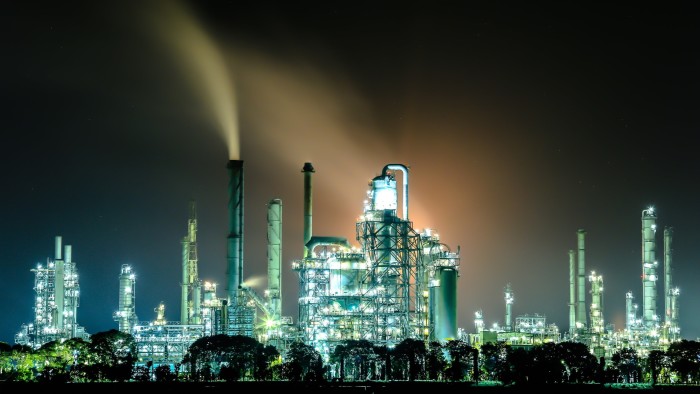Unlock the Editor’s Digest for free
Roula Khalaf, Editor of the FT, selects her favourite stories in this weekly newsletter.
A recent plunge in oil prices, prompted by Donald Trump’s trade war, has started to deplete Vladimir Putin’s war chest.
Moscow’s budget — about a third of which comes from oil and gas — may be as much as 2.5 per cent lower than expected in 2025 if crude prices stay at current levels. That would force the Kremlin to increase borrowing, cut nonmilitary spending or draw down its remaining reserves.
The average price of Urals crude, Russia’s main export grade, has fallen to the lowest in almost two years, after the US president’s tariff announcements and an unexpected move by the Opec+ coalition to boost output.
Urals was trading at about $50 a barrel as of Thursday, according to price reporting agency Argus. Russia planned its budget for 2025 based on Urals at $69.70 a barrel.

The price drop adds to pressure on the Russian economy, which is expected to slow this year after being fuelled by war-related spending. Moscow already has used some of its sovereign wealth fund to support the economy after the fallout from Putin’s full-scale invasion of Ukraine, and the accessible portion of those funds is dwindling.
In a rare acknowledgment of economic uncertainty, Russian officials have voiced concerns over the drop in oil prices.
“This indicator is very important for us in terms of budget revenues . . . The situation is extremely volatile, tense and emotionally charged,” Kremlin spokesman Dmitry Peskov told reporters earlier this week.
The shift also shows how Trump’s tariff war is indirectly hurting the Russian economy despite the US president’s recent overtures to Moscow and promise to rekindle economic ties as part of negotiations to end the war in Ukraine. Oil is still down this week, despite Wednesday’s announcement of a 90-day pause to the sweeping tariff programme.
Russia’s central bank chief Elvira Nabiullina warned on Tuesday, on the eve of Trump’s 90-day pause announcement, that “if trade wars continue, they usually lead to a global economic slowdown and possibly lower demand for our energy exports”.
If oil prices hold near current levels, Russia could lose about a trillion roubles this year, the equivalent to 2.5 per cent of its expected budget revenues, according to chief economist at Moscow-based T-Investments Sofya Donets. That would mean GDP growth falling by 0.5 percentage points, she said.
Still, it would take several months for lower oil prices to feed through into budget revenues, according to Janis Kluge, a Russia expert at the German Institute for International and Security Affairs.
Russia’s economy is already running at full capacity, with growth — fuelled largely by war-related government spending — expected to slow. Official forecasts suggest an expansion of 1-2.5 per cent in 2025, down from about 4 per cent over the past two years.
That makes it unlikely that the state can offset falling oil revenues with funds from non-energy sources.
As Putin’s full-scale invasion of Ukraine has dragged into its fourth year, the government’s ability to cushion the economy has been diminishing.

Since 2020, the liquid portion of Russia’s sovereign wealth fund — known as the national welfare fund — has fallen by two-thirds. If it is used to cover a widening budget deficit, it might not last far beyond the end of the year, according to Benjamin Hilgenstock, head of macroeconomic research and strategy at the Kyiv School of Economics Institute.
“Whether the regime can do anything about this aside from painful cuts to non-war expenditures is a different matter,” Hilgenstock said.
About $340bn of the central bank’s reserves also remain frozen under western sanctions, sharply limiting the room for manoeuvre.
With the welfare fund running lower, Moscow may be forced to cut spending, which would be a shift from its wartime increases. Economists warn any cuts will probably fall on nonmilitary budget areas, such as social spending.
If the oil price stabilises at a very low level, Russia will probably have to tax export companies more to offset some of the revenue decline, according to Oleg Kuzmin, chief economist at Renaissance Capital. “After taxation adjustment and debt financing, Russia will have to consider spending cuts — which also remains an option but beyond ‘plan A’’ or ‘’plan B’,’’ he added.
Recommended
Moscow could also try to raise more debt on international markets, as its public debt burden currently stands below 30 per cent of GDP, a low level by international standards. But for many foreign investors Russian bonds remain toxic.
At home, banks were focused on lending to the private sector and had shown little interest in financing deficits, said Hilgenstock, who expected serious constraints for the Russian economy but not a sudden collapse.
“It is all not great for the budget, but not catastrophic,” he said.



